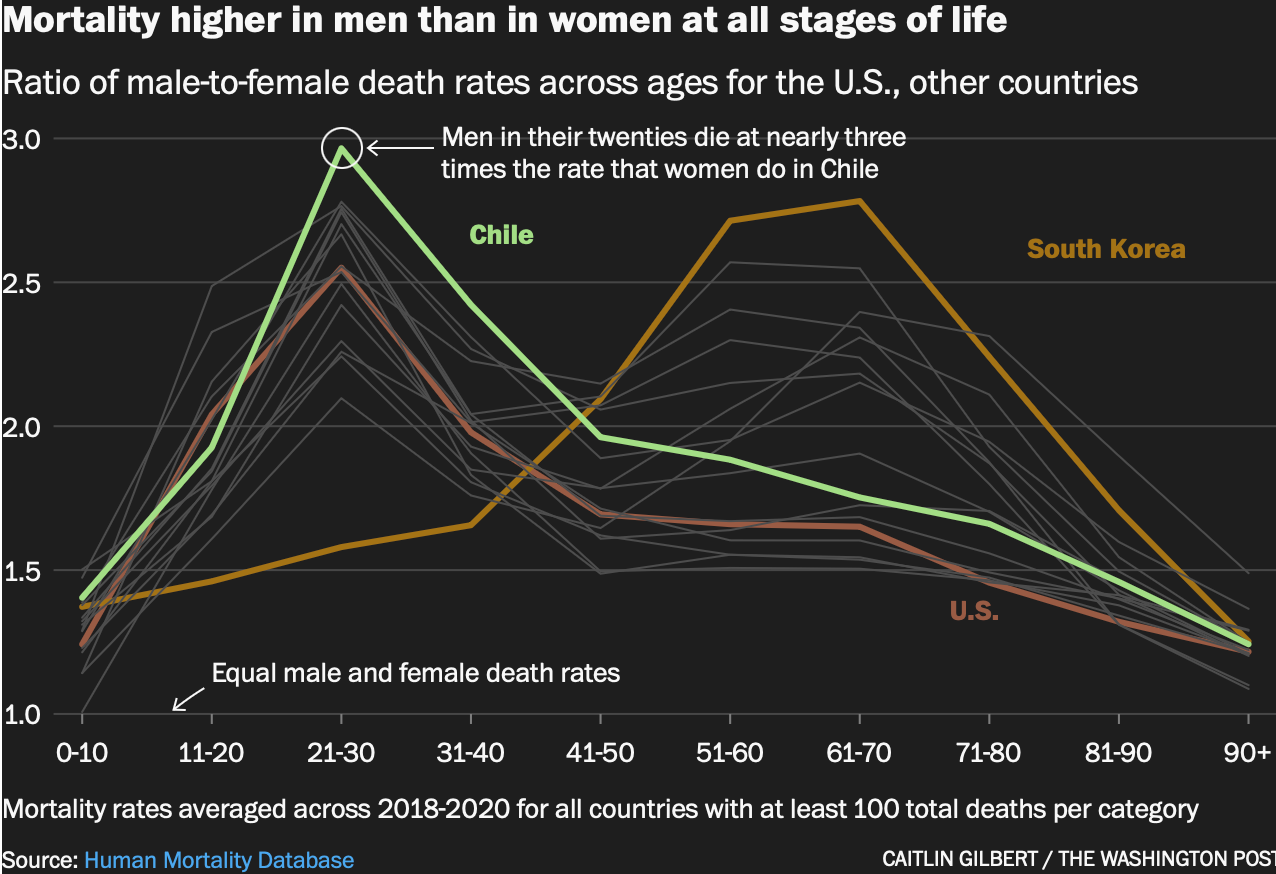Why do men keep dying? 🪦⚰️

There’s something weird going on in the demographic world. That’s not a sentence you thought you’d hear today!
But there is, and I’m going to tell you about it. Figures around the average life expectancy of men and women in America have skewed. Women are living longer than men, which is hardly anything new. But the gulf between men and women has grown to the highest it’s been in more than 25 years.

Men are now dying six years earlier than women do, on average. In the UK, the gap is closer, but men are still meeting their maker much earlier than their female counterparts. Sidenote: the data has yet to factor in nonbinary and trans people.
This is a global phenomenon. In Chile, men in their twenties are three times more likely to die than women. In South Korea, men die at twice the rate of women once they hit 50.

What on earth is going on? 🫨
Well, men have always died earlier than women on average. There were several reasons for this:
- ‘Biological destiny’ - that’s actually a thing not just a catchy sub-heading! The frontal lobe of the brain - the part that controls judgment - develops more slowly in boys and young men than in their female counterparts. This may, says researchers contribute to more boys and men dying in accidents or due to violence than girls and women.
- War - Men historically did jobs that came with higher fatality rates, like war.
- Hormones - Estrogen appears to have a protective effect on women as they age, especially against heart disease. Whereas excess testosterone in men increases their chances of heart disease. Fun fact: Even though estrogen appears to be protective in women, studies in the 1970s showed that when estrogen was given to men, instead of being protective, it caused double the rate of heart attacks as those in a placebo group.
But the gulf is growing. There have been upticks in the amount of men dying because of war - see Ukraine, but perhaps less known about is a protracted war in Ethiopia that has claimed some 100,000 lives. But those are local conflicts, and don’t explain the US and UK numbers, or many other parts of the world.
The answer, it seems is down to how we think about healthcare more broadly.
Women are better at healthcare than men 🤼♀️

There is an odd historical belief in some medical circles that women were ‘over-users’ of medical services, compared to men. Why? Because when health care providers were created - think the NHS in the 1950s - they were built around the behaviours of men. Because men didn’t go that often, they became the ‘standard’ for health care provision.
Women, sadly, were often dismissed as hysterical or “anxious” when they sought care. Sidenote: this belief is even worse for black women, who often experience the worst of health inequality.
But that view, thankfully is starting to fade from view. Instead, it is being replaced with the idea that men are not using health care enough.
“We used to think women were overutilizing health care, and men were doing it correctly,” says Derek Griffith, director of Georgetown University’s Center for Men’s Health Equity in the Racial Justice Institute.
“What we realized was that women were doing it better, mostly for preventive care, and men were actually underutilizing health care.”
That simple idea turns up, everywhere it seems.
- Men died far more often from Covid than women did. The age-adjusted death rate for COVID-19 was 140 deaths per 100,000 for males and 87.7 per 100,000 for females.
- More men die of diabetes than women. The death rates for men are 31.2 per 100,000 people vs. 19.5 per 100,000 for women.
- Cancer kills more men than women - 189.5 per 100,000 - compared with 135.7 per 100,000 for women. Black men have the highest cancer death rate at 227.3 per 100,000. Among Black women, the cancer mortality rate is 149 per 100,000.
- Men die by suicide nearly four times more often than women, based on 2020 data from the Centers for Disease Control and Prevention. The rate of suicide is highest in middle-aged White men, but teen boys also face a high risk.
Dig into those details again, and it’s very clear: Men do not go to the doctors as often as women do, except when they are under the age of 21, which researchers believe is because a parent, usually a mother will maintain higher levels of healthcare interaction on their behalf.
In essence, women have developed a consistent relationship with health care over time, whereas men have been trapped by a cultural norm that their health, be it emotional or physical is something to be dealt with alone.
For example: while diseases such as diabetes, heart disease, and hypertension are common in men and women, men often wait longer to seek care and the illnesses are diagnosed at later stages, leading to poorer outcomes.
But going back to the recent shift again, I found a study that looked at the role political belief played in men’s attitudes towards risk-taking. Turns out that the more conservative you are, the more likely you are to play fast and loose with your life. That played out spectacularly during the COVID-19 pandemic.
Those men who were more inclined to Republican (in the US) or Conservative (in the UK) ideals, were more likely to flout rules and endanger themselves. Globally, these views have been on the rise over the last decade, offering a strange clue as to why the gap has been growing.
So what can be done? 🤷

Vote for the most progressive political party you can! Only joking (sort of).
This is where the debate can get thorny. While advocates have suggested more funding is needed to find better ways of helping men into healthcare, many argue that would come at the expense of the strides made in women’s healthcare. A dollar in the pocket of men’s health would be a dollar out of health care for women.
With health care stretched in many parts of the world, that might well be true. But beyond writing to your local politician and demanding to know how much is being spent on gendered care, we can all be better at helping men find the help they may be reluctant to need.
Asking for help shouldn’t be seen as a sign of weakness. Instead, it should be a giant billboard with flames coming out of it that says, "I’d quite like to not die earlier than I should please."
Things we learned this week 🤓
- 💏 People are less likely to pick a mate if they HAVEN’T been to therapy.
- 🤔 We’re not supposed to be ‘on’ all the time, so why do productivity gurus say we must be?
- 🧠 Being awful to someone dulls your brain’s capacity for empathy.
- 🧘 Want to cut back on impulse purchases? Try breathing instead.
If you would be so kind 🙏
I’m building out my content on video and podcasts, and I’d love your support.
🤜 Hit that subscribe button over on YouTube.
🤜 Tune into my podcast every week.
I love you all. 💋

